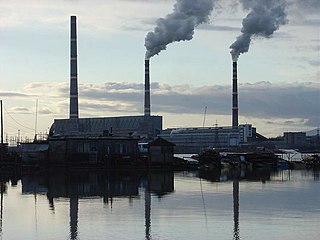
A carbon tax is a tax levied on the carbon emissions required to produce goods and services. Carbon taxes are intended to make visible the "hidden" social costs of carbon emissions, which are otherwise felt only in indirect ways like more severe weather events. In this way, they are designed to reduce greenhouse gas emissions by increasing prices of the fossil fuels that emit them when burned. This both decreases demand for goods and services that produce high emissions and incentivizes making them less carbon-intensive. When a hydrocarbon fuel such as coal, petroleum, or natural gas is burned, most or all of its carbon is converted to CO2. Greenhouse gas emissions cause climate change, which damages the environment and human health. This negative externality can be reduced by taxing carbon content at any point in the product cycle. Carbon taxes are thus a type of Pigovian tax.

Renovo is a borough in Clinton County, Pennsylvania, United States, 28 miles (45 km) northwest of Lock Haven. In 1900, 4,082 people lived there, and in 1910, 4,621 lived there, but in the 2010 census the borough population was 1,228.
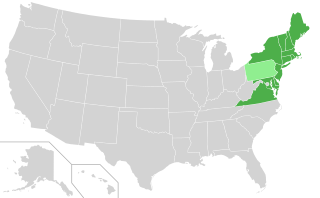
The Regional Greenhouse Gas Initiative (RGGI, pronounced "Reggie") is the first mandatory market-based program to reduce greenhouse gas emissions by the United States. RGGI is a cooperative effort among the states of Connecticut, Delaware, Maine, Maryland, Massachusetts, New Hampshire, New Jersey, New York, Rhode Island, Vermont, and Virginia to cap and reduce carbon dioxide (CO2) emissions from the power sector. RGGI compliance obligations apply to fossil-fueled power plants 25 megawatts (MW) and larger within the 11-state region. Pennsylvania's participation in the RGGI cooperative was ruled unconstitutional on November 1, 2023. North Carolina's entrance into RGGI has been blocked by the enactment of the state's fiscal year 2023-25 budget.
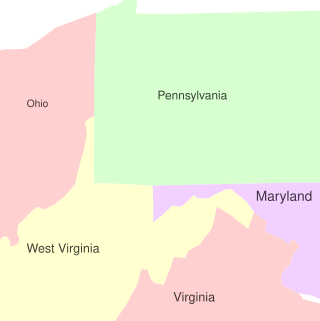
Allegheny Energy was an electric utility headquartered in Greensburg, Pennsylvania. It owned and operated electric generation facilities and delivered electric services to customers in Pennsylvania, West Virginia, Maryland, and Virginia. Allegheny Energy was incorporated in Maryland in 1925 as West Penn Electric Company. One of its predecessor companies dates back to the formation of West Penn Power on January 31, 1907.

Homer City Generating Station is a decommissioned 2-GW coal-burning power station near Homer City, in Indiana County, Pennsylvania, USA. It is owned by hedge funds and private equity firms and is operated by NRG Energy. Units 1 and 2, rated at 660 MWe, began operation in 1969. Unit 3, rated at 692 MWe nameplate capacity, was launched in 1977. It employed about 124 people.

Joseph J. Romm is an American researcher, author, editor, physicist and climate expert, who advocates reducing greenhouse gas emissions to limit global warming and increasing energy security through energy efficiency and green energy technologies. Romm is a Fellow of the American Association for the Advancement of Science. In 2009, Rolling Stone magazine named Romm to its list of "100 People Who Are Changing America", and Time magazine named him one of its "Heroes of the Environment (2009)", calling him "The Web's most influential climate-change blogger".
The Global Warming Solutions Act of 2006, or Assembly Bill (AB) 32, is a California State Law that fights global warming by establishing a comprehensive program to reduce greenhouse gas emissions from all sources throughout the state. AB32 was co-authored by then-Assemblymember Fran Pavley and then-Speaker of the California Assembly Fabian Nunez and signed into law by Governor Arnold Schwarzenegger on September 27, 2006.
The Pennsylvania Department of Environmental Protection (DEP) is the agency in the U.S. state of Pennsylvania responsible for protecting and preserving the land, air, water, and public health through enforcement of the state's environmental laws. It was created by Act 18 of 1995, which split the Department of Environmental Resources into the Department of Environmental Protection and the Department of Conservation and Natural Resources. Its current secretary is Jess Shirley.
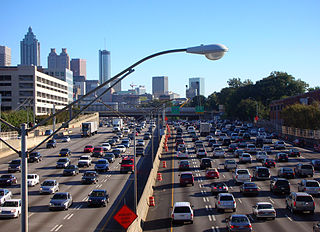
The United States produced 5.2 billion metric tons of carbon dioxide equivalent greenhouse gas (GHG) emissions in 2020, the second largest in the world after greenhouse gas emissions by China and among the countries with the highest greenhouse gas emissions per person. In 2019 China is estimated to have emitted 27% of world GHG, followed by the United States with 11%, then India with 6.6%. In total the United States has emitted a quarter of world GHG, more than any other country. Annual emissions are over 15 tons per person and, amongst the top eight emitters, is the highest country by greenhouse gas emissions per person. However, the IEA estimates that the richest decile in the US emits over 55 tonnes of CO2 per capita each year. Because coal-fired power stations are gradually shutting down, in the 2010s emissions from electricity generation fell to second place behind transportation which is now the largest single source. In 2020, 27% of the GHG emissions of the United States were from transportation, 25% from electricity, 24% from industry, 13% from commercial and residential buildings and 11% from agriculture. In 2021, the electric power sector was the second largest source of U.S. greenhouse gas emissions, accounting for 25% of the U.S. total. These greenhouse gas emissions are contributing to climate change in the United States, as well as worldwide.

The fossil fuels lobby includes paid representatives of corporations involved in the fossil fuel industry, as well as related industries like chemicals, plastics, aviation and other transportation. Because of their wealth and the importance of energy, transport and chemical industries to local, national and international economies, these lobbies have the capacity and money to attempt to have outsized influence on governmental policy. In particular, the lobbies have been known to obstruct policy related to environmental protection, environmental health and climate action.

Coal generated about 19.5% of the electricity at utility-scale facilities in the United States in 2022, down from 38.6% in 2014 and 51% in 2001. In 2021, coal supplied 9.5 quadrillion British thermal units (2,800 TWh) of primary energy to electric power plants, which made up 90% of coal's contribution to U.S. energy supply. Utilities buy more than 90% of the coal consumed in the United States. There were over 200 coal powered units across the United States in 2022. Coal plants have been closing since the 2010s due to cheaper and cleaner natural gas and renewables. Due to measures such as scrubbers air pollution from the plants kills far fewer people nowadays, but deaths in 2020 from PM 2.5 have been estimated at 1600. Environmentalists say that political action is needed to close them faster, to also reduce greenhouse gas emissions by the United States and better limit climate change.

ExxonMobil Corporation is an American multinational oil and gas corporation and the largest direct descendant of John D. Rockefeller's Standard Oil. The company, which took its present name in 1999 per the merger of Exxon and Mobil, is vertically integrated across the entire oil and gas industry, and within it is also a chemicals division which produces plastic, synthetic rubber, and other chemical products. ExxonMobil is headquartered near the Houston suburb of Spring, Texas, though officially incorporated in the U.S. state of New Jersey.

Greenhouse gas emissions by Australia totalled 533 million tonnes CO2-equivalent based on greenhouse gas national inventory report data for 2019; representing per capita CO2e emissions of 21 tons, three times the global average. Coal was responsible for 30% of emissions. The national Greenhouse Gas Inventory estimates for the year to March 2021 were 494.2 million tonnes, which is 27.8 million tonnes, or 5.3%, lower than the previous year. It is 20.8% lower than in 2005. According to the government, the result reflects the decrease in transport emissions due to COVID-19 pandemic restrictions, reduced fugitive emissions, and reductions in emissions from electricity; however, there were increased greenhouse gas emissions from the land and agriculture sectors.
The climate change policy of the United States has major impacts on global climate change and global climate change mitigation. This is because the United States is the second largest emitter of greenhouse gasses in the world after China, and is among the countries with the highest greenhouse gas emissions per person in the world. In total, the United States has emitted over a trillion metric tons of greenhouse gasses, more than any country in the world.

Environment America is a federation of state-based environmental advocacy organizations in the United States. The organization researches and advocates for environmental policies through lobbying, litigation, and the mobilization of public support. Environment America advocates new laws and policies to address climate change, air pollution and water pollution, and is a proponent of clean energy, while opposing offshore drilling.

John C. Dernbach is a nationally and internationally recognized authority on sustainable development, climate change, and environmental law. He is Commonwealth Professor of Environmental Law and Sustainability at Widener University Commonwealth Law School and Director of its Environmental Law and Sustainability Center.
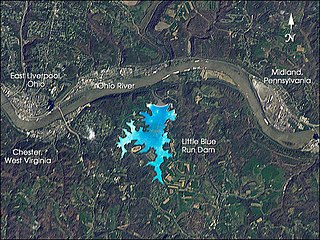
Little Blue Run Lake or Little Blue Run is the largest coal ash impound in the United States. FirstEnergy owns the site, located in Western Pennsylvania and parts of the Northern Panhandle of West Virginia, and has disposed of billions of gallons of coal waste into the body of water. Several court cases have been brought against the company as a result of the damage caused by the company's practices at the site.

John Quigley is a former Secretary of the Pennsylvania Department of Environmental Protection, having been nominated by Pennsylvania Governor Tom Wolf and confirmed in June 2015 and serving until his resignation in May 2016. From 2009 to 2011, Quigley served as secretary of the Pennsylvania Department of Conservation and Natural Resources. Prior to his appointment as secretary, Quigley worked for DCNR in several capacities, including overseeing strategic initiatives and operations, and as chief of staff. He is the first and only person in the history of Pennsylvania to hold the positions of both DCNR and DEP Secretary.
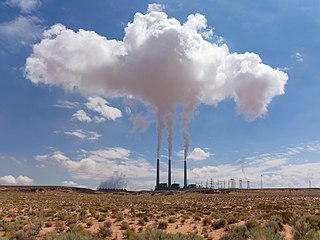
The Clean Power Plan was an Obama administration policy aimed at combating anthropogenic climate change that was first proposed by the Environmental Protection Agency (EPA) in June 2014. The final version of the plan was unveiled by President Obama on August 3, 2015. Each state was assigned an individual goal for reducing carbon emissions, which could be accomplished how they saw fit, but with the possibility of the EPA stepping in if the state refused to submit a plan. If every state met its target, the plan was projected to reduce carbon emissions from electricity generation 32% by 2030, relative to 2005 levels, as well as achieving various health benefits due to reduced air pollution.
350 Bay Area is a San Francisco Bay Area regional grassroots climate activism 501(c)(3) non-profit organization. 350 Bay Area is inspired by 350.org, but has no legal connection. 350 Bay Area is associated with several local 350 groups, including 350 San Francisco, 350 East Bay, 350 Contra Costa, 350Marin, 350 Sonoma, Napa Climate NOW! and 350 Silicon Valley. The organization works to eliminate carbon pollution and achieve clean energy and environmental justice.















